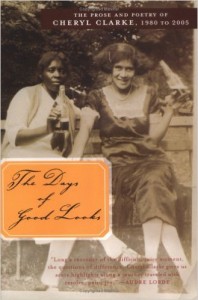 The Days of Good Looks: The Prose and
The Days of Good Looks: The Prose and
Poetry of Cheryl Clarke, 1980 – 2005
by Cheryl Clarke
Carroll & Graff. 419 pages, $16.95 (paper)
FEW QUEER WRITERS plant their flag as firmly at the intersection of poetry and politics as does black lesbian poet Cheryl Clarke. This is clearly evidenced by Clarke’s latest book, a collection of her best known and most powerful essays (including “Lesbianism: An Act of Resistance”) interspersed with equally powerful and resonant poems. The Days of Good Looks: The Prose and Poetry of Cheryl Clarke, 1980–2005 presents almost twenty essays that range over the rough and rich terrain of race and sexuality, paired with poems on the same subjects.
The book’s most persistent and cogent message involves a critique of patriarchy, especially as it pertains to gender and sexuality, and this message is often accompanied by straightforward calls to action. Perhaps most eye-opening to readers unfamiliar with Clarke’s work or the issues she explores may be her uncovering of the rifts and anxieties that trouble the various identities—feminist, lesbian, African-American, poet—that she straddles. Writes Clarke: “The challenge and difficulty have been in entering into dialogue with the black literary community and the white feminist literary community, who are willing, without irony, to impose silence and invisibility on black lesbian writers—either actively or unconsciously.”
Some of Clarke’s strongest writing comes during those moments when she speaks about her own problems experienced within minority groups in which “black lesbians relegate feminism to white women, castigate black women who propose forming coalitions with predominantly white feminist groups, minimize the white woman’s oppression and exaggerate her power, and then finally judge that a black lesbian’s commitment to the liberation of black women is dubious because she does not sleep with a black woman” (“Lesbianism: An Act of Resistance”). Indeed what makes Clarke’s voice such a compelling one is the fact that she doesn’t let anyone off the hook: “All of us have to accept or reject allies on the basis of politics, not on the specious basis of skin color.”
Clarke shows herself to be an acute and measured critic of some of the most famous and accomplished black writers. Her blasting of the infamously volatile Amiri Baraka (a.k.a. LeRoi Jones) is a high point in the essay “The Failure to Transform,” one of her stronger pieces. With humor and acerbity she takes Baraka to task for his “rabid” homophobia and sexism. Clarke cleverly parodies Baraka’s essay “Black Woman” with the title, “Black Macho Man’s Narcissistic Fantasy.”
One of the most enjoyable aspects of this collection is Clarke’s ruminations on the black writers who helped shape her views. The essay “The Space in Me Where Baldwin Lives” talks about how James Baldwin’s work produced in her “the poetics of resistance in black literature for the first time.” But her strongest affections are saved for the indomitable black lesbian poet Audre Lorde. Lorde’s unabashedly political poetry and her ability to make vibrant the idea that “the personal is the political” is foundational for Clarke. When she cites Lorde, readers may find the lines an appropriate coda to much of Clarke’s work: “So it is better to speak/ remembering/ we were never meant to survive.”
Clarke writes with clarity and most of these essays have enough current running through them to jolt the reader with her calls for action or a change of perspective. Still, there are times when the writing becomes mired in the lingo of political ideology and “isms.” One example will suffice: “The dialogic relationships of black nationalist poetries and black lesbian feminist and lesbian feminist poetry continued throughout the 70’s. Black Arts women reified heterosexuality and nation, black and white lesbian feminist poets reified lesbian sexuality and lesbian ‘ways of knowing.’”
In the end, what brings the collection’s ideas to life is the poetry that Clarke has included here. (Her books of poetry include Experimental Love, Humid Pitch, Living as a Lesbian, and Narratives: Poems in the Tradition of Black Women.) While she puts forth terms like “poetics of resistance” and slippery terms like “lesbian aesthetic,” “black lesbian aesthetic” and even “black lesbian feminist aesthetic,” these expressions find their best definition operationally through the poems. Her verse is generally fluid, blues-inflected, and narrative, and draws from historical as well as deeply personal wells. After all, observes one poem, “Memory is your only redemption.”
___________________________________________________________________
Christopher Hennessy is the author of Outside the Lines: Talking with Contemporary Gay Poets (Univ. of Michigan Press).





